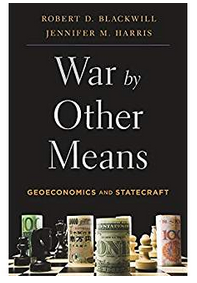War by Other Means: Geoeconomics & Statecraft by Robert D Blackwill and Jennifer M Harris, Harvard University Press, Pages 384, $19.95

“War by Other Means” is a book which the supporters of free-trade and globally integrated markets would find to be enlightening. While the book is very US focused and is more in realms of foreign policy, it provides interesting insights about the use of trade as foreign policy tool. The book would especially be useful to understand the escalating trade war more from a political angle rather than frequently read economic arguments.
The book focusses on geo-economics which can essentially be defined as the use of economic instruments to advance foreign policy goals. The reason why I say it is important to understand geo-economics is because the present-day conversations focus on global trade and liberal economic systems, but conveniently forget the final goal of any ruling entity –power. Today’s economists have made trade an end in itself, divorcing it of its foreign policy implications and global power projection. As one goes through the book, one would realize that the current economic system (which is increasingly being threatened) evolved as a tool for achieving certain foreign policy goals and not independently of those goals. As a result, there is nothing sacrosanct about current economic order.
The book mainly has three sections – the first section discusses the art of economic statecraft, defining geo-economics and the reasons for its re-emergence. One of the reasons cited is that the current liberal order provides avenues for mercantilist powers, which results in a declining appetite for armed conflicts. I think first section is the most enlightening section as it lists down the geo-economic tools that are available in the present context, i.e., sanctions, trade policy, cyber warfare, aid and energy. Authors also argue that tools can only be used effectively if the states have the relevant geo-economic endowments – ability to control outbound investments, large domestic markets, influence over commodity prices and centrality to the global financial system.
The second section focusses on how China continues to deploy geo-economic tools to its advantage – these include using its big reserves for strategic outbound investments (e.g., projects like OBOR and CPEC), launching of institutions parallel to World Bank and IMF) and controlling domestic market access (compulsory technology sharing, instituting import bans, etc.) in a very finely tuned manner. Authors also discuss how China uses cyber warfare to its advantage.
The third section focusses on historical use of geo-economic tools by US from independence to the end of Cold War. The discussion on how geo-economic tools were used very successfully after World War II is particularly insightful. For example, the Marshall Plan was essentially a geo-economic tool. Authors argue that American foreign policy makers have forgotten the rich history of geo-economic practice. They then go on to claim that this has been a result of military and liberal economic policies which were developed post WW II becoming independent of their initial goal – which was to expand US geopolitical power. The book closes with a discussion on how the US can get back to using geo-economic tools to maintain its global power.
Overall, authors’ key contention is that liberal trade and financial system which was developed by US after WW-II for its own strategic interest is now being smartly used by several emerging powers to weaken the US clout. Hence it would be prudent for the US authorities to reconsider their support of prevalent system. Especially, the US needs to get rid of its penchant of segregating economic and political issues. Authors also acknowledge that the Chinese and Russian attempts to use geo-economic tools for their political advantage often backfire as citizens in countries which face undue pressure often revolt (for e.g., Myanmar and Sri Lanka).
I am a rookie in the subject area so would refrain from any criticism of the book. The book gives an alternative view of what is happening in the form of trade war, which is essentially a global power struggle, and potentially how it could evolve. It also attempts to establish the current liberal trade and global financial system at the centre-point of global affairs.
The fact that one of the authors has been an ambassador for United States to India, and presidential coordinator for Afghanistan, Iran and Iraq bolster the credentials of this book.



